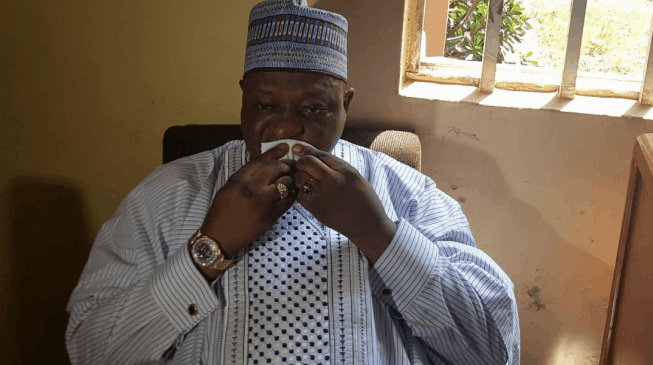Nigeria News
Why Jailed Dariye’s Appeal For Mercy Was Rejected (Details)


How And Why Former Governor Of Plateau, Dariye Was Jailed Without Option Of Fine.
Mr Joshua Dariye, a serving senator representing Plateau Central Senatorial District, was accused of embezzling N1.162 billion ecological funds belonging to his state.
He was charged to court by anti-graft agency, EFCC, in 2007.
The trial which stalled for over eight years following Mr Dariye’s protracted attempt to prevent his prosecution continued after the Supreme Court ordered the senator to proceed with his case in 2015.
Dariye’s Defence
Mrs. Banjoko said Mr Dariye’s lawyers, led by former Attorney General of the Federation, Kanu Agabi, contended that the charge against the defendant was defective for a number of reasons.
According to Mr Agabi, the fact that the charge sheet against his client did not indicate that the diverted funds were taken “dishonestly” meant that a case of fraudulent intention could not be proven against Mr Dariye.
The former attorney general of the federation, also submitted that the prosecution had a duty to present all the participants in the said diversion, to court as witnesses.
The Senior Advocate of Nigeria further argued that failure of the prosecution to present all the participants rendered their evidence defective.
Mr Agabi also submitted that the prosecution ought to have been bound by the findings of the Plateau State Assembly committee which found no case against the defendant.
Joshua Dariye being led away by EFCC
Similarly, Mr Agabi said the case against his client should have been viewed with the principle of “estoppel” which requires that once a ruling is delivered regarding a given issue, no other court should commence trial on a case of similar composition with the one already decided upon by the sister court.
Mr Agabi cited a previous ruling where six bankers were tried for their alleged involvement in the said transfer while Mr Dariye served as governor.
He contended that since the Federal High Court in Kaduna acquitted the bankers for lack of evidence, the trial of Mr Dariye on the same diversion amounts to an abuse of court process. According to Mr Agabi, the fate that befell the bankers should also be advanced on his client.
Mr Agabi further argued that the evidences adduced by the same prosecution in both trials were incoherent.
EFCC’s Argument
While The EFCC prosecuted Dariye , it asked the court to determine whether having recourse to the evidence adduced in court, the prosecution was yet to prove its case against the defendant.
Rotimi Jacobs who led the prosecution responded to Mr Agabi’s submissions regarding the bankers. He cited English Criminal laws to prove that the principle of estoppel did not apply to criminal cases.
He also argued that the evidences presented in Mr Dariye’s case were conclusive for the case in which they were brought and in compliance with section 173 of the evidence act.
The judge said the issues raised by the defence, included fundamental matters that needed to be analysed.
She cited parts of the judgement from the previous ruling mentioned by Mr Agabi.
Mrs Banjoko said the ruling of the federal court acquitting the bankers was premised on the fact that the prosecution did not include the principal actor in the case of misappropriation.
Reading through the previous judgement, Mrs Banjoko said failure of the EFCC to include Mr Dariye in the charge meant that “no iota of evidence was adduced in court to show that the cheques (acted upon by the bankers) were fraudulently procured.”
“I am unable to see how the disbursement has shown any dishonest misappropriation. Did Mr Dariye misappropriate it for himself? If so, no evidence was shown,” Mr Banjoko stated while reading through the previous judgement by the federal high court judge, Liman J.
“It is clear from the above that the facts and evidence of misappropriation were not brought to the fore,” Mrs. Banjoko said.
She said that the decision of the federal court to discharge the bankers was accurate except that it was due to the absence of Mr Dariye in that trial.
Mr Dariye was not included in the 2005 trial of the bankers and their bank (defunct All States Trust Bank) because he was in office as governor of Plateau State and then enjoyed immunity from prosecution.
Although the bankers were acquitted, the bank was found guilty as charged.
Reacting to Mr Agabi’s argument that the prosecution ought to have presented same witnesses as those adduced during the trial of the bankers, Mrs Banjoko said it is not inconceivable to deduce that the class of evidence to prove a case of misappropriation was not the same as the class of evidence to prove the offence of aiding the said diversion.
On the controversial acquitting of Mr Dariye by the Plateau State House of Assembly committee, Mrs Banjoko said the committee had recognised its inability to proceed with investigations into the offence against Mr Dariye following the filing of the matter in court.
She said the committee noted that the matter had become subjudice and was about suspending its investigation before it dramatically announced a decision, discharging Mr Dariye from allegations against him.
“That conclusion was gotten from the air,” Mrs Banjoko said.
Regarding the allegations that the statements made by the defendant were given in duress, the judge said the defendant’s counsel should have raised the objection ahead of his final address to the court.
“Learned silk ought to have advanced his objection during the trial,” Mrs Banjoko said.
Dariye’s Offence
Going into the substantive matter, Mrs Banjoko narrated the developments that followed an earlier investigation by Peter Clark, a detective constable with the Metropolitan police of the United Kingdom.
Joshua Dariye being led away by EFCC Joshua Dariye being led away by EFCC
She said Mr Clark’s investigation led to the discovery of £816, 000 pounds traced to Mr Dariye abroad.
After diligent investigation, Mr Dariye was invited for questioning, then granted bail in December 2004 with an undertaken to return to the UK for further questions.
Despite promising the security agency that he would return, Mr Dariye never went back to respond to the interrogations of the metro-police. He is still being sought by the UK authorities.
Shortly after Mr Dariye left office in 2007, his trial in Nigeria began in earnest and prevented the defendant’s extradition to the UK.
In Nigeria, Mr Dariye was accused of distributing the Plateau State ecological funds to various groups, including the Peoples Democratic Party.
The diverted funds were transferred to a secret account with the name Ebenezer Rethnam, domiciled with the All States Trust Bank. Although the said account was opened secretly and managed with a waiver that prevented it’s owner from submitting an identification photograph, Mrs Banjoko said the evidence in court indicate clearly that Ebenezer Rethnam and Mr Dariye were the same.
Joshua Dariye being led away by EFCC Joshua Dariye being led away by EFCC
She mentioned some of the diverted funds channelled through the bank from the Plateau State account at the CBN.
Mrs Banjoko noted the submissions of a defence witness who confirmed part of the money was diverted to the PDP.
She condemned the submissions of the defence witness who told the court that he viewed no wrong in Mr Dariye’s disbursement of public funds to the PDP, since “his party was the one in power.”
“From his statement it shows that he has no knowledge of party funds of even his own party. Funds of Plateau State government and that of the PDP are exclusive. They never mix. His submission is quite disturbing and shocking and is an embarrassment to the party,” Mrs Banjoko said.
After listing an array of such dubious disbursement of funds, Mrs Banjoko said Mr Dariye should have even attempted to explain his actions by entering the witness box.
“It is expected that he should have entered the witness box and explain why the disbursements were made. He said nothing.”
The Sentence, Verdict
“In the absence of concrete evidence justifying these payments, it can safely be described as misappropriation,” Mrs Banjoko said.
Joshua Dariye being led away by EFCC Joshua Dariye being led away by EFCC
Mrs Banjoko found Mr Dariye guilty of 15 out of the 23-count charge brought against him.
Mr Dariye was convicted for two main categories of offences, namely criminal breach of trust which attracts a two year sentence for each affected count and criminal misappropriation which has a penalty of 14 years.
The sentences are to run concurrently which means he will spend a maximum 14 years in jails.
“Be merciful. You are a Christian, your name is Jacob,-Dariye ‘s Appeal For Mercy
Before the Verdict, Mr Dariye’s lawyer, Paul Erokoro, described his client’s actions as a product of ignorance while blaming the military system and the bank for the actions of his client.
According Mr Erokoro, Mr Dariye who is a charted accountant was misguided when he approached the bank for financial assistance.
Responding, Mr Jacobs drew the attention of the court to the many years of legal battle embarked upon by the defendant.
As he was speaking, Mr Dariye suddenly stood up and asked the prosecution lawyer to be merciful.
“Be merciful. You are a Christian, your name is Jacob,” he said
Joshua Dariye being led away by EFCC Joshua Dariye being led away by EFCC
The judge noted the efforts of Mr Erokoro but added that “there should not be compromise in corruption. Corruption is corruption.”
Mrs Banjoko, however urged the parties and Nigerians to separate the judge from the judgement.
After the judgement, Mr Dariye was led into a police van from where he was transported to Kuje prison which would be his home for 14 years unless the ruling is upturned by the appeal court.












